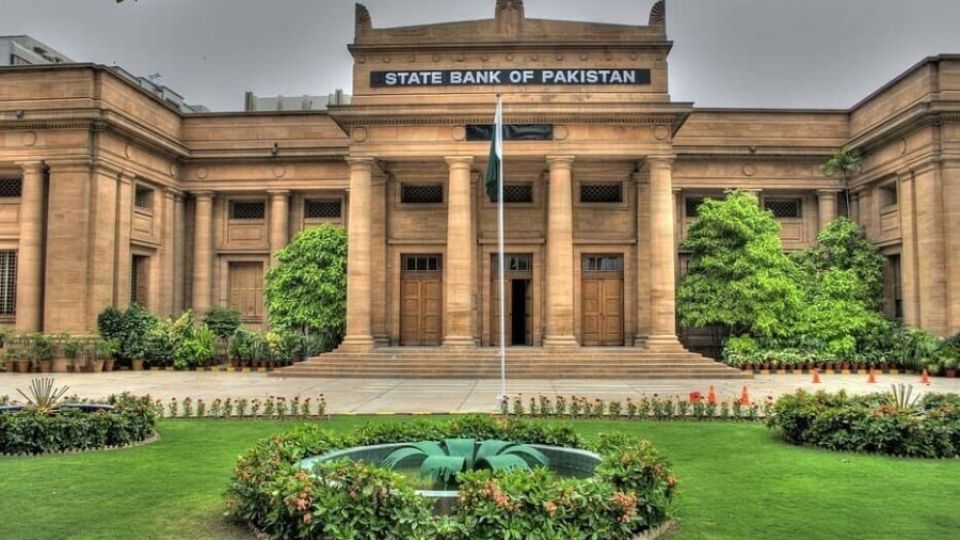June 27, 2023
ISLAMABAD – The State Bank of Pakistan (SBP) in an emergency meeting on Monday hiked the policy rate by 100 basis points (bps) to 22 per cent.
The announcement came after a meeting of the bank’s Monetary Policy Committee (MPC).
According to the SBP, the MPC explained that the potential upside risks to the inflation outlook had increased from its last meeting on June 12.
1/3 MPC of #SBP convened an emergency meeting today, where it noted that potential upside risks to the inflation outlook have increased from the last meeting, and accordingly decided to raise the policy rate by 100bps to 22%.https://t.co/unuS6xmJHz#SBPMonetaryPolicy pic.twitter.com/FWenKLqdkt
— SBP (@StateBank_Pak) June 26, 2023
“MPC views that these risks are mainly coming from the implementation of new measures in the fiscal and external sectors, which are important in the context of the completion of the ongoing IMF (International Monetary Fund) programme.
“MPC noted that today’s action is necessary to keep the real interest rate firmly in positive territory on a forward-looking basis that would help in bringing down inflation towards the medium-term target of five to seven per cent by the end of fiscal year 25,” the SBP said.
2/3 MPC views that these risks are mainly coming from the implementation of new measures in the fiscal and external sectors, which are important in the context of completion of the ongoing IMF program.
— SBP (@StateBank_Pak) June 26, 2023
Providing further details, a press release issued by the SBP said that “two important domestic developments” since its June 12 meeting had slightly deteriorated the inflation outlook and could potentially increase pressure on the already stressed external account.
“First, there are certain upward revisions in taxes, duties and petroleum development levy rate in FY24 budget as approved by the National Assembly on June 25. Second, the SBP, on June 23, withdrew its general guidance for commercial banks on prioritisation of imports,” the press release reads.
It added that while the MPC viewed these measures as “necessary” in the context of the ongoing IMF programme’s completion, they had nonetheless increased the upside risks to the inflation outlook.
The MPC said that it was of the view that the additional tax measures in the approved budget were likely to contribute to inflation both directly and indirectly, while the import relaxation might exert pressure on the foreign exchange market.
It added that the latter might result in higher-than-earlier anticipated exchange rate pass-through to domestic prices.
Regarding its move to hike the policy rate by 100bps, the MPC said it viewed the action as “necessary to keep real interest rate firmly in the positive territory on a forward-looking basis”.
The MPC said its decision would help further anchor inflation expectations, noting that they were already moderating over the last few months, and support bringing down inflation towards the medium-term target of 5-7pc by the end of FY25, barring any unforeseen developments.
“The MPC views that today’s decision, along with the expected completion of the ongoing IMF programme and the government adhering to the target of generating a primary surplus in FY24, would help in addressing external sector vulnerabilities and reduce economic uncertainty.
“The committee reiterated that it would continue to carefully monitor evolving economic developments and stands ready, if necessary, to take appropriate action to achieve the objective of price stability over the medium term,” the press release added.
Wait for IMF nod
After revising the budget in line with the Fund’s demands, the government expects a breakthrough announcement from the global lending agency over the next few days to get direly needed bailout funds.
“Almost all the irritants between the IMF staff and the Ministry of Finance were addressed hours before the finance minister’s wind-up speech on Saturday,” an official had said, adding that the announcement about the successful completion of the ninth review was an IMF’s privilege and just a formality now.
The official had said it was now up to the IMF’s mission to line up the precise dates for the lender’s executive board approval and disbursement of funds. However, he had acknowledged that it was not on the calendar until June 30, when the $6.5 billion Extended Fund Facility agreed in 2019 is set to expire.
The budget changes include Rs215bn additional tax measures, a Rs85bn spending cut, withdrawal of an amnesty on foreign exchange inflows, lifting of import restrictions, a Rs16bn hike in Benazir Income Support Programme allocations, and the powers to increase the petroleum levy from Rs50 to Rs60 per litre.


